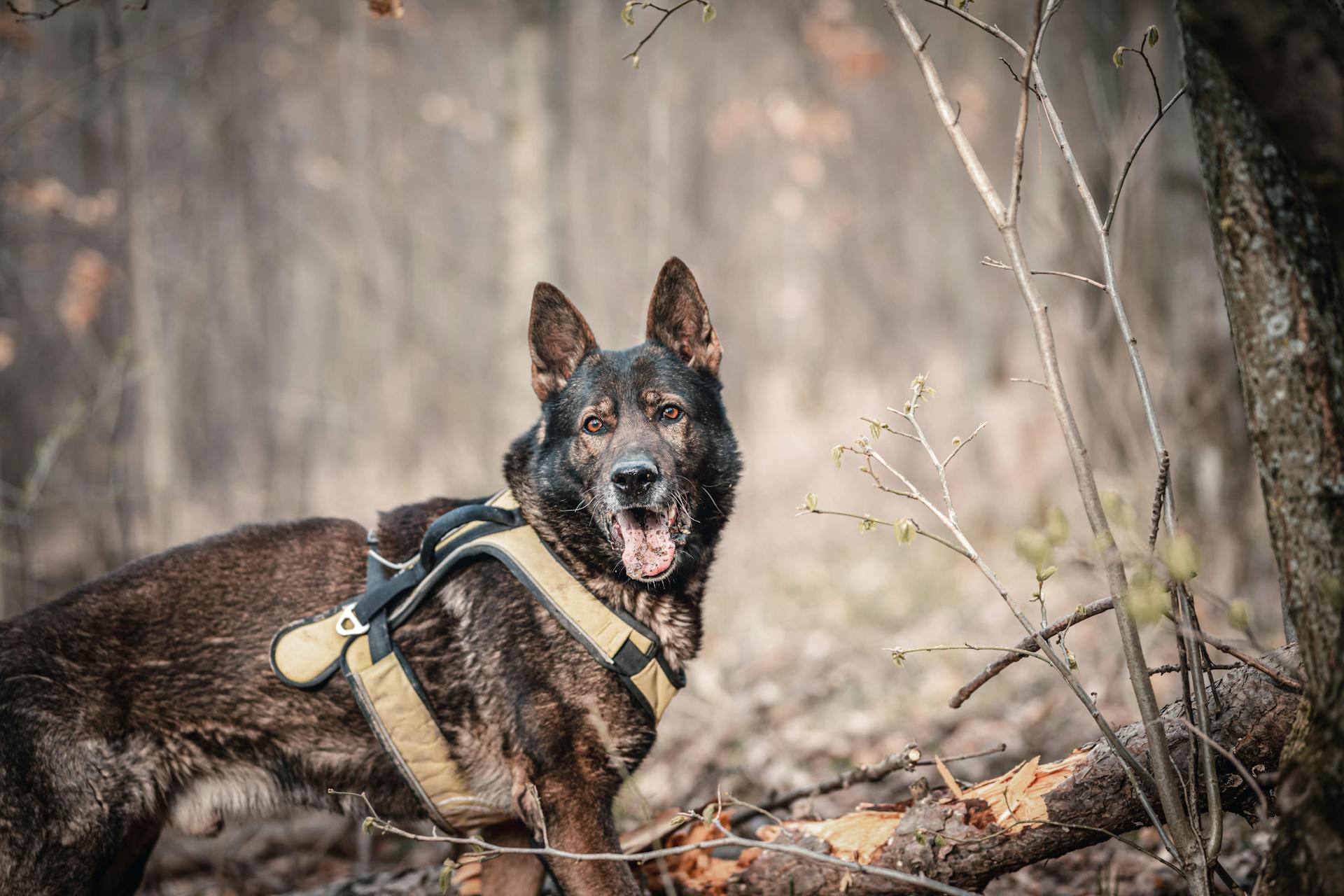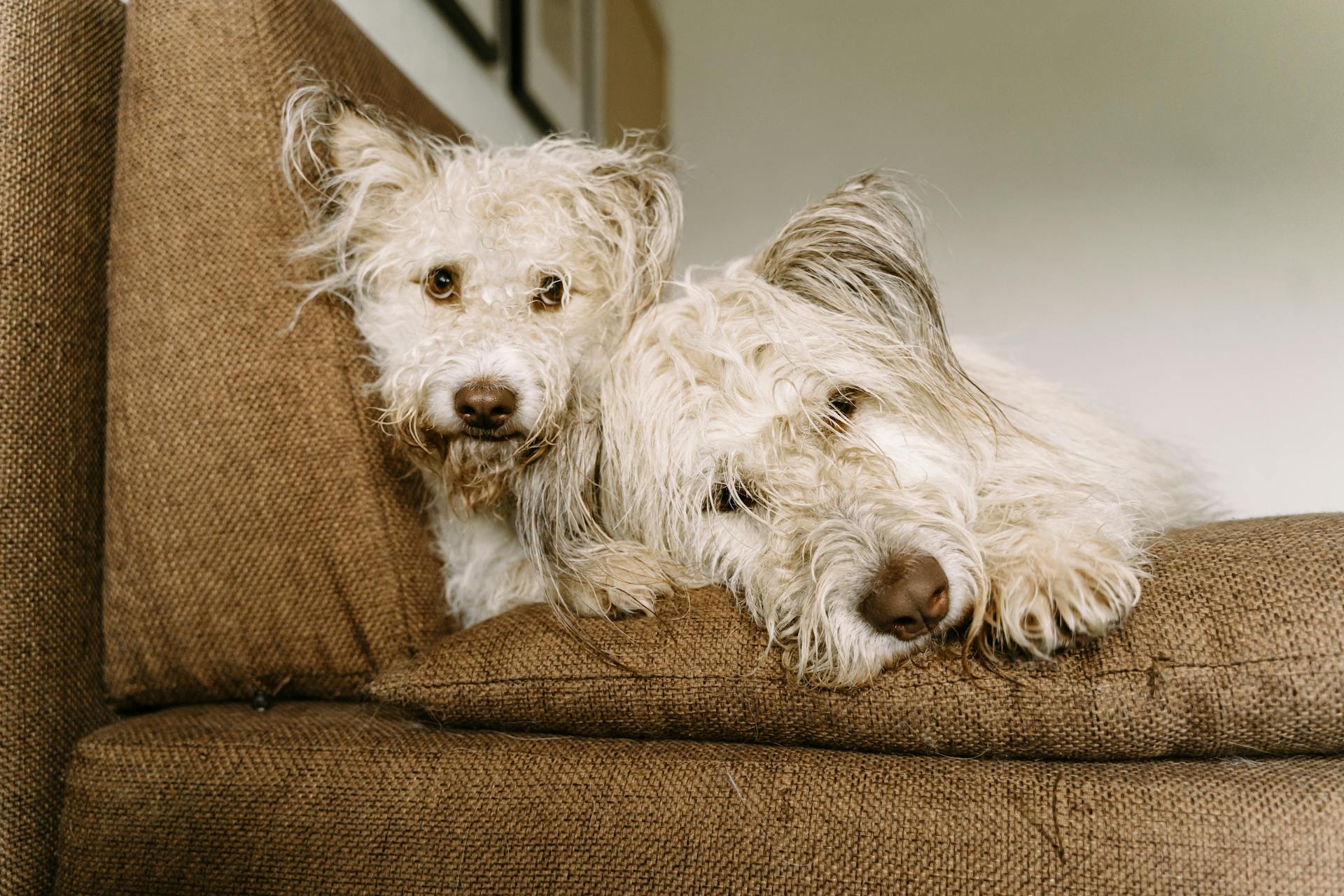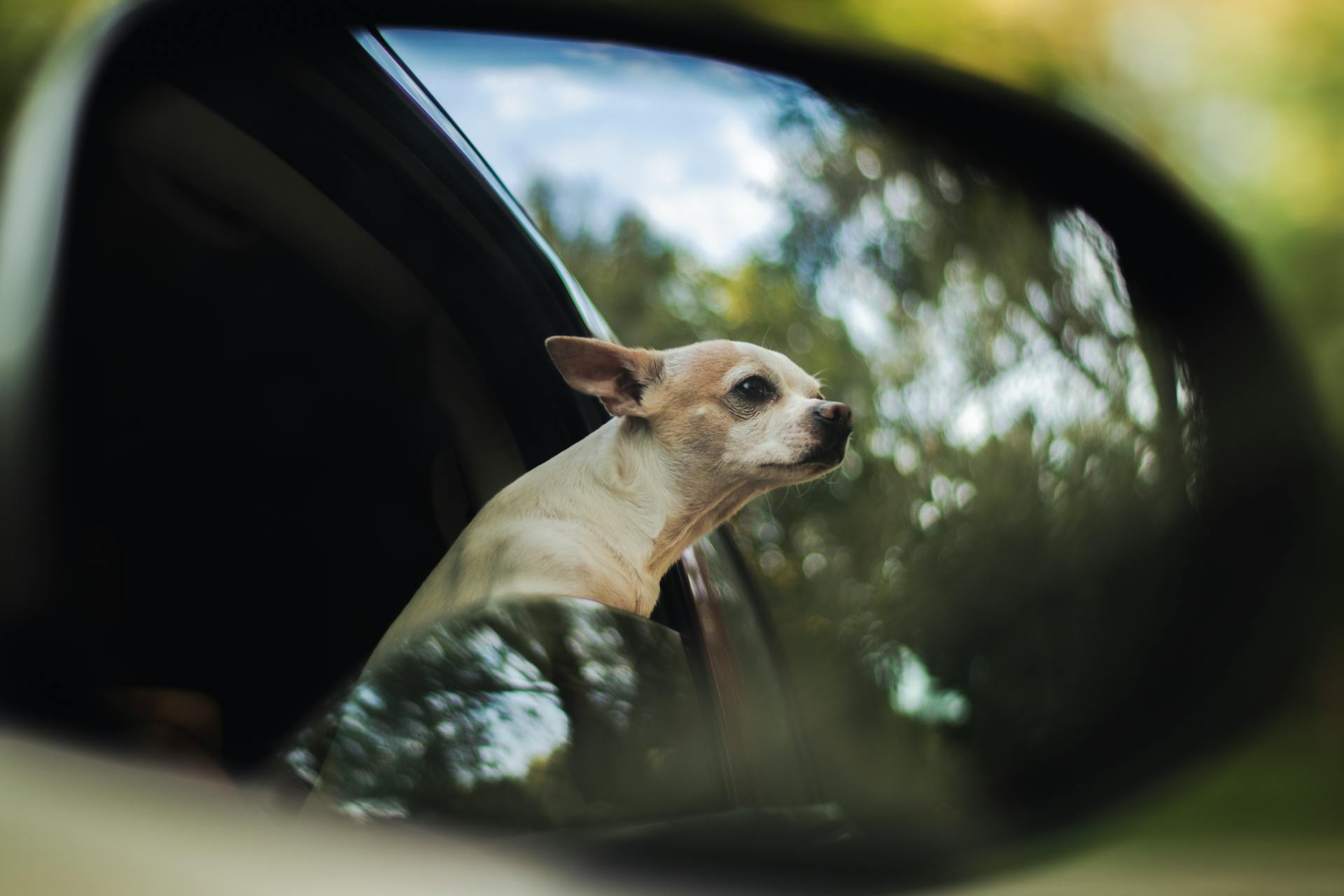
German Shepherds are a popular breed known for their loyalty and intelligence, but they can also be prone to separation anxiety. This means they may experience distress when left alone, often resulting in destructive behavior.
Separation anxiety in German Shepherds can manifest in different ways, such as barking, howling, or even trying to escape. According to research, German Shepherds are one of the breeds most susceptible to separation anxiety.
It's not uncommon for German Shepherds to become overly attached to their owners, which can exacerbate separation anxiety. In fact, studies show that German Shepherds are more likely to develop separation anxiety if they have a strong bond with their owners.
Causes and Genetics
German Shepherds' history and breeding played a significant role in shaping their temperament and making them prone to separation anxiety. Originally bred in Germany as herding dogs in 1899, they worked closely with their owners and formed strong bonds.
Their loyalty and attachment to their owners are rooted deeply throughout the generations of the breed's existence. German Shepherds are extremely loyal and protective of their owners, which makes them vulnerable to separation anxiety.
Breed characteristics such as intelligence, work ethic, sensitivity, protectiveness, and social nature also contribute to their susceptibility to separation anxiety. German Shepherds are known for their strong loyalty and attachment to their owners, which can become deeply bonded to the point of separation anxiety when left alone.
Here are some key breed characteristics that make German Shepherds prone to separation anxiety:
- Loyalty and Bonding: Strong loyalty and attachment to owners
- Intelligence: Highly trainable, but also perceptive and aware of cues
- Work Ethic: Strong desire for activity and mental stimulation
- Sensitivity: Easily detect changes in environment and owners' emotions
- Protectiveness: Naturally protective, perceiving departure as a threat
- Social Nature: Thrives on companionship and interaction
Breed Genetics
German Shepherds were originally bred in Germany in the late 19th century as herding dogs. This history is crucial in understanding their breed-specific traits that may contribute to anxiety.
Their strong attachment to their owners is rooted deeply throughout the generations of the breed's existence. This loyalty is a result of their original purpose as working dogs that relied heavily on their owners.
See what others are reading: Police Dogs Breed
German Shepherds were also used as war dogs during WWII, which further solidified their bond with their owners. This experience likely contributed to their protective nature and strong attachment to their family.
Here are some key breed characteristics that make German Shepherds more prone to separation anxiety:
- Loyalty and Bonding: German Shepherds are deeply bonded to their owners, which can lead to separation anxiety when left alone.
- Intelligence: Their high intelligence makes them highly trainable, but also more perceptive and aware of their owner's cues.
- Work Ethic: Originally bred for herding and guarding, German Shepherds have a strong desire to be active and engaged.
- Sensitivity: German Shepherds are highly sensitive to their environment and their owners' emotions.
- Protectiveness: This breed is naturally protective, which can manifest as anxiety when they feel their owner is in danger or away from them.
- Social Nature: German Shepherds thrive on companionship and interaction, making them prone to separation anxiety when left alone.
Why Does My Dog Have?
German Shepherds are prone to separation anxiety due to their breed characteristics, which include loyalty, intelligence, work ethic, sensitivity, protectiveness, and social nature.
Their strong loyalty and attachment to their owners can make them deeply bonded, sometimes to the point of separation anxiety when left alone.
Intelligence plays a significant role, as German Shepherds are highly trainable and perceptive, picking up on cues indicating your departure, which can trigger anxiety.
A strong work ethic and desire for activity and mental stimulation can lead to boredom and anxiety when left alone.
Sensitivity to their environment and owners' emotions can exacerbate their anxiety, especially if they sense your anxiety about leaving.
Suggestion: Do Dog Anxiety Vests Work
Their natural protectiveness can manifest as anxiety when they feel their owner is in danger or away from them.
German Shepherds thrive on companionship and interaction, making them more prone to develop separation anxiety when left alone for extended periods.
Early socialization and training can help build their confidence and resilience when faced with temporary separations from their owners.
Here are some key breed characteristics that contribute to German Shepherds' susceptibility to separation anxiety:
- Loyalty and Bonding: Strong attachment to owners
- Intelligence: Highly trainable and perceptive
- Work Ethic: Desire for activity and mental stimulation
- Sensitivity: Sensitive to environment and owners' emotions
- Protectiveness: Natural protectiveness of owners
- Social Nature: Thrive on companionship and interaction
Recognizing the Issue
German Shepherds can exhibit anxiety in many ways, which may not be immediately apparent as separation anxiety. These signs can manifest when you leave the house for hours or even when you're just leaving the room for a short period.
Excessive panting, shaking, pacing, and excessive drooling are common signs of separation anxiety in German Shepherds. Aggression and excessive barking are also possible indicators.
Dogs who were once abandoned or puppies who have been with their owner from a very young age are more prone to these anxious behaviors. It's essential to recognize the early signs of separation anxiety to address the issue before it escalates.
Here's an interesting read: Signs of Prey Drive in Dogs
Here are some early signs to watch for:
- Increased clinginess
- Excessive whining or pacing
- Destructive behavior
- Inappropriate elimination
- Excessive salivation
- Seeking comfort objects
- Attempts to escape
- Excessive grooming
- Changes in appetite
- Vocalization
Keep in mind that these signs can vary in intensity and may not always be present in every dog with separation anxiety. It's crucial to consult with a veterinarian or a professional dog behaviorist if you suspect your German Shepherd is experiencing separation anxiety.
Treatment and Prevention
You can't treat separation anxiety in German Shepherds quickly, it takes time and patience.
Training and behavior modification are essential in helping your German Shepherd overcome separation anxiety.
With the right help, your German Shepherd can live a happy life free of stress.
Training and Behavior
Training and behavior play a crucial role in addressing separation anxiety in German Shepherds. Crate training is an excellent option for young dogs, teaching them to see the crate as a safe space. It's essential to start with baby steps and work your way up, rewarding your dog with treats for calm behavior.
Older dogs may not take as well to crate training, but positive reinforcement techniques can be effective. This involves starting with your normal routine, such as putting on your shoes and coat, and rewarding your dog for remaining relaxed. With time and repetition, you can gradually increase the duration of your departures.
Understanding German Shepherd breed characteristics is key to addressing separation anxiety. These dogs are loyal, intelligent, and sensitive, making them prone to anxiety when left alone. They thrive on companionship and mental stimulation, and providing them with physical exercise, mental challenges, and companionship can help reduce the risk of separation anxiety.
Shepherd Temperament
German Shepherds are known for their intelligent, loyal, and energetic temperament. They are generally reserved but friendly dogs.
One key trait of German Shepherds is their loud bark, which can be reduced with proper socialization. They tend to be gentle with children and other animals, but may develop behavioral problems like aggression if left alone for too long or not given enough exercise.
German Shepherds are not naturally aggressive, but their protective instinct means they can be hesitant when first meeting strangers. This is rooted in their history as herding dogs and their strong attachment to their owners.
Here are some key characteristics of German Shepherds that can contribute to separation anxiety:
- Loyalty and bonding: German Shepherds are highly devoted and loving companions.
- Intelligence: They are highly trainable, but also highly perceptive and can pick up on cues indicating your departure.
- Work ethic: German Shepherds have a strong desire to be active and engaged.
- Sensitivity: They can easily detect changes in their environment and their owners' emotions.
- Protectiveness: German Shepherds are naturally protective of their owners and may perceive their departure as a threat.
- Social nature: They thrive on companionship and interaction.
By understanding these breed-specific characteristics, you can take steps to prevent or manage separation anxiety in your German Shepherd.
Shepherd Toys
Having a few favorite toys can provide a sense of comfort and security for dogs with separation anxiety.
Favorite toys can be rotated often to keep them interesting and prevent boredom.
German Shepherds may benefit from having a variety of toys to choose from.
Puzzle toys or treat dispensers can keep dogs occupied and distracted during times of stress.
Seeking Help
If your German Shepherd's separation anxiety is severe, you may need to consult with a professional to help you manage its condition. A behaviorist or veterinarian can help you to create a plan to reduce your dog's anxiety and stress levels.
For another approach, see: Does Neutering a Dog Help with Aggression
Separation anxiety is a common problem for German Shepherds, but it can be managed with the proper training and care.
If you think that your dog may be suffering from separation anxiety, consult with a professional to create a treatment plan. With the right help, your German Shepherd can live a happy and stress-free life.
Frequently Asked Questions
What breed of dog has the most separation anxiety?
While separation anxiety can affect any dog breed, research suggests that breeds with strong attachment instincts, such as Labrador Retrievers and Cavalier King Charles Spaniels, may be more prone to this issue. Understanding the underlying causes and seeking professional help is crucial to address separation anxiety in dogs.
Sources
- https://www.chillpaws.com/blogs/news/anxious-german-shepherds-and-their-attachment-to-their-owners
- https://relaxmydog.com/blog/breeds-prone-to-separation-anxiety
- https://www.petplan.co.uk/pet-information/dog/breed/german-shepherd/
- https://gsdcolony.com/blogs/news/german-shepherd-separation-anxiety
- https://danceswithdogs.com/why-german-shepherds-are-so-clingy/
Featured Images: pexels.com


